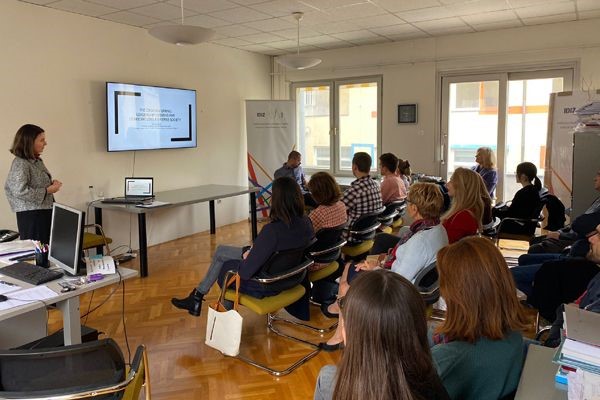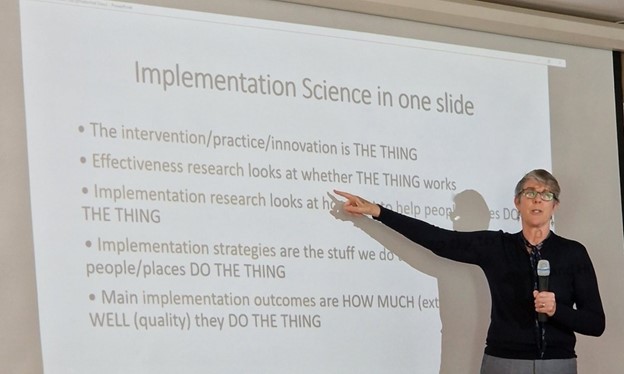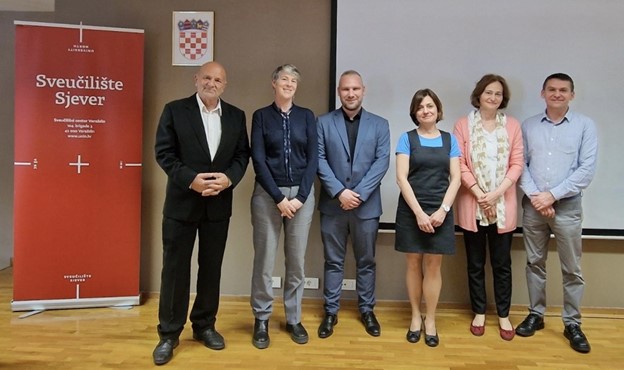All Disciplines
Croatia
Number of recipients
In addition to being a prestigious academic exchange program, the Fulbright Program is designed to expand and strengthen relationships between the people of the United States and citizens of other nations and to promote international understanding and cooperation. To support this mission, Fulbright Scholars may be asked to give public talks, mentor students, and otherwise engage with the host community, in addition to their primary activities.
For teaching or teaching/research: teach undergraduate and graduate courses in area of specialization. Initiate or contribute to curriculum development and research projects, as requested.
For research: conduct research in area of specialization.
Scholars selected for this grant will be required to attend a mandatory Pre-Departure Orientation in Summer 2025 and an In-Country Orientation in fall 2025.
For Flex grants, see Flex Option section.
Any Croatian academic or research institution; applicants are encouraged to arrange their own affiliation.
Please start your research about studying in Croatia here: Croatia welcomes you! (studyincroatia.hr)
If you are looking for a host institution, links to institutions can be found here: Study Programmes in English (studyincroatia.hr)
For more information on conducting research in Croatia, visit:
For teaching or teaching/research: five months (preferred) or nine months. For research: four to six months. For Flex grants, see the Flex Option section.
For teaching or teaching/research: one-semester grants must begin in October 2025 or March 2026; two-semester grants must start in October 2025.
For research: grants may begin any time during the academic year -- see "Additional Qualification Information." However, October and March are preferred by Post. Summer months are discouraged (July, August).
Flex Awards are offered for research grants only. Maximum 2 segments.
The Flex Award is designed for scholars who require multiple visits to the host country. This option allows grants to be conducted over two or three short segments. Applicants must select Flex in the application form, and clearly describe their plans for Flex in their project statement, including a project timeline. Flex grantees may be asked to give public talks, mentor students, and otherwise engage with the host-country academic community.
All applicants must meet the Program eligibility requirements (click to review the requirements).
If you are applying for a teaching or teaching/research award, we prefer that you obtain a letter of invitation from your host university approving your field and lecture plan. Please start your research about studying in Croatia here: Croatia welcomes you! (studyincroatia.hr) If you are looking for a host institution, links to institutions can be found here: Study Programmes in English (studyincroatia.hr)
For more information on conducting research in Croatia, visit:
A Foreign Researcher’s Guide to Croatia (rmobilnosto.hr)
If you are applying for a research award, the letter of invitation is optional.
Please contact FulbrightCroatia@state.gov for more details on potential placements or if you would like to establish university contacts prior to applying for an award.
Applicants for teaching programs must have two years of college-level teaching experience. Applications for research awards during the summer months (July and August) will be considered only when applicants can demonstrate that access to necessary facilities and resources have been secured.
Preference will be given to applicants who have not spent a significant amount of time in Croatia. Applicants with permanent residency in Croatia are not eligible for Fulbright U.S. Scholar awards in Croatia.
You may be asked to participate in an interview as part of the in-country selection process.
Grant benefits include a monthly maintenance allowance, comprised of a base stipend and living and housing allowances. The base stipend varies based on a scholar's current academic rank (or professional equivalent). The living allowance varies and based on the city of placement, and the number of accompanying dependents. A housing allowance will be paid to grantees by the Croatian government. The housing allowance is not included in the below monthly estimate. Dependent housing and living allowances will not be provided to Flex grantees.
$3,550
For Flex grants: round trip travel will be included for each segment of the grant.
$750 books and educational materials allowance for teaching and teaching/research grants; should be donated to the host institution (or other entity) upon grantee's departure.
Additional living allowance is provided for grantees with one accompanying dependent or two or more accompanying dependents. These amounts range from $50/month to $100/month. Housing is covered by the Croatian government.
In addition, travel allowances are provided for dependents: $2,500 for one dependent, and $5,000 for two or more dependents.
Dependents must accompany the grantee for at least 80% of the period abroad and a minimum of one semester in order to qualify for additional dependent benefits. Dependent benefits are not provided to Flex grantees.
Average monthly living expenses in Croatia are estimated between 750 and 1000 USD, depending on the type of accommodation (student dorm or privately rented housing) and the city in Croatia. Larger cities like Zagreb or Split, as well as popular tourist destinations, are generally more expensive. For more information on average prices in Croatia, please visit Numbeo. Please note that Croatia joined Eurozone on January 1, 2023. The official currency of the Republic of Croatia is the Euro. Foreign currency can be exchanged in banks, currency exchange offices, post offices, or at some hotels' reception desks. Major credit cards (Visa, Diners Club, Mastercard/Eurocard) are widely accepted in shops, hotels, and restaurants. ATMs ("bankomats") are also widely available across the country. Banks are generally open Monday to Friday from 8 am to 7 pm and on Saturdays from 8 am to 12 pm, but office hours may vary, especially in smaller towns. Banks are closed on Sundays and national holidays. For a list of licensed banks in Croatia, please consult the database of the Croatian National Bank.
Each Fulbright Scholar will receive a monthly stipend from the Croatian Government, payable in local currency but estimated to be approximately $1,250, to cover housing expenses and contribute to other living expenses.
Please refer to the figures above for an estimate of total monthly Fulbright award benefits. Benefits may include a monthly base stipend, living and housing allowances, and additional one-time allowances. Benefits may vary based on a scholar's current academic rank (or professional equivalent), the city of placement, the type of award (teaching, teaching/research, or research), and the number of and duration of stay of accompanying dependents. Research-only or Professional Project grantees receive a standard stipend that is not adjusted for academic rank. In most cases, dependent benefits will not be provided to Flex grantees, or to grantees pursuing grants less than four months (or a semester) in length.
Final grant amounts will be determined prior to the start of the academic year and are subject to the availability of funds. The United States Department of State reserves the right to alter, without notice, participating countries, number of awards and allowances.
Croatia
Choosing Croatia for your Fulbright grant offers you the chance to work in the European Union's newest member state and enjoy life in a beautiful country with a historically rich culture. Croatia, located in the center of Europe, declared independence from Yugoslavia in 1991, making it one of Europe's youngest nations. Croatia joined the European Union in July 2013. Zagreb's capital has all the characteristics of a historic and modern central European city. Zagreb is a university center — home to 40 graduate and undergraduate institutions and over 80,000 students. Zagreb University opened in the latter half of the 17th century and is one of the oldest universities in Europe. The cities of Split, Zadar, Osijek, Dubrovnik, Pula, Koprivnica, Varazdin, and Rijeka also have universities. There is also RIT Croatia, a global satellite campus of the Rochester Institute of Technology located in Dubrovnik and Zagreb, and a growing number of private universities focusing on business and tourism.
Fulbright grantees in Croatia select from a variety of programming that includes an in-country orientation program, invitations to Embassy events, and opportunities to participate in educational programs and activities around Croatia. There are five American Corners in public and university libraries in Croatia – in Zagreb, Zadar, Osijek, Vukovar, and Rijeka. The Embassy encourages and facilitates Fulbright grantees' participation in American Corner programs. Croatian alumni of exchange programs and institutions are eligible to compete for small grants through the Embassy's Notices of Funding Opportunities (NOFOs), and Fulbright grantees often work with host institutions and partners to propose follow-on projects.
Croatia is rich in cultural programs, culinary events, and outdoor activities (Official website of the Croatian National Tourist Board | Croatia.hr). Most major cities boast summertime cultural and food festivals and winter advent holiday markets. Zagreb won the award for the best advent market in Europe for many years. The Adriatic Coast is famous for its Mediterranean landscapes and climate. Istria, the peninsula just south of Trieste in Italy, offers many lovely weekend getaways only a 2-3 hour drive from Zagreb. Dalmatia is Croatia's most famous vacation area. Historical relics abound in towns like Zadar, Split, and Dubrovnik. Croatia's city of Dubrovnik in southern Dalmatia is often called the Pearl of the Adriatic and is a UNESCO World Heritage site. Northern Dalmatia boasts several gorgeous coastal cities, such as Zadar and Šibenik. A warm current flowing north along the coast keeps the climate mild. The sea temperature is warm enough for swimming until the end of September and beginning again in May. It is easy to explore and enjoy other European countries from Zagreb, with Italy, Slovenia, Hungary, Austria, and Germany just a short drive away.
The academic year runs from October until June, with semesters running from October until January, and March until June. Research grants are for 4-6 months; teaching and teaching/research grants are for 1-2 semesters during the academic year. Preference is given to one-semester grants. English is sufficient for teaching; research grants require language fluency commensurate with the requirements of the proposed project.




Visit our Scholar Directory to view and search all Fulbright alumni. You can also learn more about Fulbright Alumni Ambassadors.

For information regarding affiliation options, please contact the Public Diplomacy Section at U.S. Embassy Zagreb at FulbrightCroatia@state.gov.
Post prefers one semester teaching/research grants (five months).
Research-only grants should be 4 to 6 months.